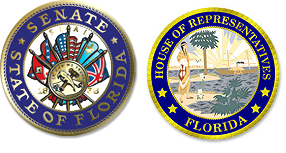Florida State Legislature
State Legislative Process

The Florida State Legislature is most active during the months of January to May. House of Representatives and Senate committees meet during January and February and begin their legislative session beginning on the first Monday after the first Tuesday in March and lasting for no more than 60 days.
Committees
House and Senate committees meet to provide a more in depth and critical look at bills that prior to debate by the entire legislature. Committees have a specialized function, such as budget, education, and government oversight. Some committees have smaller more specialized committees called sub-committees. These Sub-committees are used to supplement the full committee by focusing on a narrow range of issues inside the full committee’s jurisdiction.
Legislation that is introduced by a member of the House or Senate is referred to one or more committees by the Chamber leadership (Speaker of the House or Senate President). Committees may vote to take the following actions on a bill: favorable, favorable with amendments, favorable with committee substitute, or unfavorable. If amendments are adopted in committee, they still must be heard and adopted by the full House or Senate.
Budget Process
Florida’s budget process is governed by the laws and Constitution of the state. The process involves citizen input, state agencies, the Governor, and the Legislature. The development of the state budget begins more than a year before its effective date, and the budget is not final until adopted by the Legislature and signed by the Governor. The Legislature will convene in its regular session beginning in March. The budget passed by the Legislature is valid for one year, beginning each July 1, and ending on June 30.
The budget development process has three major phases: agency requests (Board of Governors), Governor’s recommendations, and legislative adoption. Following instructions issued jointly by the Governor’s Office and the Legislature in July, state agencies begin developing long-range program plans and budget requests which lay out the programs and funding needs of each agency for the next fiscal year.
The Governor’s Office analyzes the agency requests and works to develop the Governor’s budget recommendations. The Governor’s recommendations are based on state priorities and economic forecasts and reflect a balance between the Governor’s policies and available revenues. The Governor’s budget recommendations are typically submitted to the Legislature thirty days before the start of the legislative session each year. During years where the Governorship changes hands, it may take the new Governor a little extra time to analyze and propose a new budget.
Following presentation of the Governor’s recommended budget, the Legislature begins its review during committee meetings prior to the start of the legislative session. While considering the proposed budget, legislative committees hold public meetings with agency leaders and interested citizens.
During the legislative session, the Florida House and Senate each pass a budget reflecting the priorities of its members. These budgets are referred to as general appropriations bills. Differences between the Senate and House budgets are resolved in a joint conference committee.
The report of this conference committee becomes the General Appropriations Act and is signed by the Speaker of the House and the President of the Senate and is presented to the Governor. The Governor has line item veto authority which may be used to delete any specific budget item within the appropriations act. Once the Governor has completed his line item vetoes, he signs the General Appropriations Act into law, establishing the statewide budget for the next fiscal year. A two-thirds majority vote of both the Senate and House is required to overturn any of the Governor’s line item vetoes.


